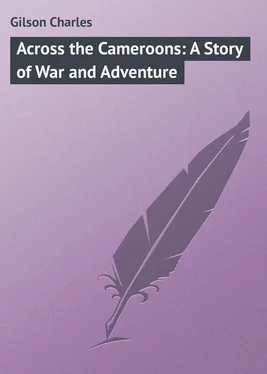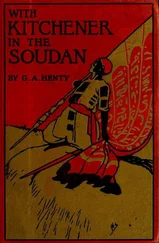Charles Gilson - Across the Cameroons - A Story of War and Adventure
Здесь есть возможность читать онлайн «Charles Gilson - Across the Cameroons - A Story of War and Adventure» — ознакомительный отрывок электронной книги совершенно бесплатно, а после прочтения отрывка купить полную версию. В некоторых случаях можно слушать аудио, скачать через торрент в формате fb2 и присутствует краткое содержание. Жанр: Прочие приключения, foreign_prose, на английском языке. Описание произведения, (предисловие) а так же отзывы посетителей доступны на портале библиотеки ЛибКат.
- Название:Across the Cameroons: A Story of War and Adventure
- Автор:
- Жанр:
- Год:неизвестен
- ISBN:нет данных
- Рейтинг книги:3 / 5. Голосов: 1
-
Избранное:Добавить в избранное
- Отзывы:
-
Ваша оценка:
- 60
- 1
- 2
- 3
- 4
- 5
Across the Cameroons: A Story of War and Adventure: краткое содержание, описание и аннотация
Предлагаем к чтению аннотацию, описание, краткое содержание или предисловие (зависит от того, что написал сам автор книги «Across the Cameroons: A Story of War and Adventure»). Если вы не нашли необходимую информацию о книге — напишите в комментариях, мы постараемся отыскать её.
Across the Cameroons: A Story of War and Adventure — читать онлайн ознакомительный отрывок
Ниже представлен текст книги, разбитый по страницам. Система сохранения места последней прочитанной страницы, позволяет с удобством читать онлайн бесплатно книгу «Across the Cameroons: A Story of War and Adventure», без необходимости каждый раз заново искать на чём Вы остановились. Поставьте закладку, и сможете в любой момент перейти на страницу, на которой закончили чтение.
Интервал:
Закладка:
Gilson Charles
Across the Cameroons: A Story of War and Adventure
CHAPTER I-Captain von Hardenberg
Late on a September afternoon, in the year 1913, two boys returned to Friar's Court by way of the woods. Each carried a gun under his arm, and a well-bred Irish water-spaniel followed close upon their heels. They were of about the same age, though it would have been apparent, even to the most casual observer, that they stood to one another in the relation of master to man.
The one, Henry Urquhart, home for his holidays from Eton, was the nephew of Mr. Langton, the retired West African judge, who owned Friar's Court. The other was Jim Braid, the son of Mr. Langton's head-gamekeeper, who had already donned the corduroys and the moleskin waistcoat of his father's trade. Though to some extent a social gap divided them, a friendship had already sprung up between these two which was destined to ripen as the years went on, carrying both to the uttermost parts of the world, through the forests of the Cameroons, across the inhospitable hills west of the Cameroon Peak, even to the great plains of the Sahara.
Harry was a boy of the open air. He was never happier than when on horseback, or when he carried a shot-gun and a pocketful of cartridges. As for Jim, he was no rider, but there were few boys of his age who could hit a bolting rabbit or a rocketing pheasant with such surety of aim.
The Judge himself was much given to study, and was said to be a recognized authority on the primitive races of Africa and the East. For hours at a time he would shut himself up in the little bungalow he had built in the woods, where, undisturbed, he could carry out his researches. He was fond of his nephew, not the less so because Harry was a boy well able to amuse himself; and where there were rabbits to be shot and ditches to be jumped, young Urquhart was in his element.
In Jim Braid, the schoolboy found one who had kindred tastes, who was a better shot than himself, who could manage ferrets, and who, on one occasion, had even had the privilege of assisting his father in the capture of a poacher. Constant companionship engendered a friendship which in time grew into feelings of mutual admiration. In the young gamekeeper's eyes Harry was all that a gentleman should be; whereas the schoolboy knew that in Jim Braid he had found a companion after his heart.
The path they followed led them past the bungalow. As they drew near they saw there was a light in the window, and within was Mr. Langton, a tall, grey-haired man, who sat at his writing-desk, poring over his books and papers.
"My uncle works too hard," said Harry. "For the last week he has done nothing else. Every morning he has left the house directly after breakfast to come here. I think there's something on his mind; he seldom speaks at meals."
"I suppose," said Braid, "in a big estate like this there must be a good deal of business to be done?"
"I don't think that takes him much time," said the other. "He keeps his accounts and his cashbox in the bungalow, it is true, but he is much more interested in the ancient histories of India and Asia than in Friar's Court. He's a member of the Royal Society, you know, and that's a very great honour."
"He's a fine gentleman!" said Braid, as if that clinched the matter once and for all.
They walked on in silence for some minutes, and presently came to the drive. It was then that they heard the sound of the wheels of a dog-cart driving towards the house.
"That's Captain von Hardenberg," said Braid.
"I expect so," said the other. "His train must have been late. There'll be three of us to shoot to-morrow."
Braid did not answer. Harry glanced at him quickly.
"You don't seem pleased," he said.
"To tell the truth, sir," said Braid, after a brief pause, "I'm not. Captain von Hardenberg and I don't get on very well together."
"How's that?"
Jim hesitated.
"I hardly like to say, sir," said he, after a pause.
"I don't mind," said Harry. "To tell the truth, my cousin and I have never been friends. I can't think whatever possessed an aunt of mine to marry a German-and a Prussian at that. He's a military attaché, you know, at the German Embassy in London."
The dog-cart came into sight round a bend in the drive. They stepped aside to let it pass. There was just sufficient light to enable them to see clearly the features of the young man who was seated by the side of the coachman. He was about twenty-three years of age, with a very dark and somewhat sallow complexion, sharp, aquiline features, and piercing eyes. Upon his upper lip was a small, black moustache. He wore a heavy ulster, into the pockets of which his hands were thrust.
"Well, sir," said Jim, when the dog-cart had passed, "we've had a good time together, what with shooting and the ferrets, but I'm afraid it's all ended, now that the captain's come."
"Ended!" said Harry. "Why should it be ended?"
"Because I can never be the same with that gentleman as I am with you. Last time he was here he struck me."
"Struck you! What for?"
"There was a shooting-party at the Court," the young gamekeeper went on, "and I was helping my father. A pheasant broke covert midway between Captain von Hardenberg and another gentleman, and they both fired. Both claimed the bird, and appealed to me. I knew the captain had fired first and missed, and I told him so. He said nothing at the time, though he got very red in the face. That evening he came up to me and asked me what I meant by it. I said I had spoken the truth, and he told me not to be insolent. I don't know what I said to that, sir; but, at any rate, he struck me. I clenched my fists, and as near as a touch did I knock him down. I remembered in time that he was the Judge's nephew, the same as yourself, and I'd lose my place if I did it. So I just jammed both my fists in my trousers pockets, and walked away, holding myself in, as it were, and cursing my luck."
"You did right, Jim," said the other, after a pause. "You deserve to be congratulated."
"It was pretty difficult," Braid added. "I could have knocked him into a cocked hat, and near as a touch I did it."
"Though he's my cousin," said Harry, "I'm afraid he's a bad lot. He's very unpopular in the diplomatic club in London to which he belongs. When I went back to school last term I happened to travel in the same carriage as two men who had known him well in Germany, and who talked about him the whole way. It appears that he's sowing his wild oats right and left, that he's always gambling and is already heavily in debt."
"I fancy," said Braid, "that a gamekeeper soon learns to know a rogue when he sees one. You see, sir, we're always after foxes or poachers or weasels; and the first time as ever I set eyes on Captain von Hardenberg, I said to myself: 'That man's one of them that try to live by their wits.'"
"I think," said Harry, "we had better talk about something else. In point of fact, Jim, I had no right to discuss my cousin at all. But I was carried away by my feelings when you told me he had struck you."
"I understand, sir," said the young gamekeeper, with a nod.
"At all events, we must make the best of him. We're to have him here for a month."
"As long as he doesn't cross my path," said Jim Braid, "I'll not meddle with him."
Soon after that they parted, Harry going towards the house, Jim taking the path that led to his father's cottage.
In the hall Harry found his cousin, who had already taken off his hat and overcoat, and was now seated before a roaring fire, with a cigarette in one hand and an empty wine glass in the other.
"Hallo!" said von Hardenberg, who spoke English perfectly. "Didn't know I was to have the pleasure of your company. Where's my uncle?"
"In the bungalow," said Harry. "During the last few days he's been extremely hard at work."
Читать дальшеИнтервал:
Закладка:
Похожие книги на «Across the Cameroons: A Story of War and Adventure»
Представляем Вашему вниманию похожие книги на «Across the Cameroons: A Story of War and Adventure» списком для выбора. Мы отобрали схожую по названию и смыслу литературу в надежде предоставить читателям больше вариантов отыскать новые, интересные, ещё непрочитанные произведения.
Обсуждение, отзывы о книге «Across the Cameroons: A Story of War and Adventure» и просто собственные мнения читателей. Оставьте ваши комментарии, напишите, что Вы думаете о произведении, его смысле или главных героях. Укажите что конкретно понравилось, а что нет, и почему Вы так считаете.












